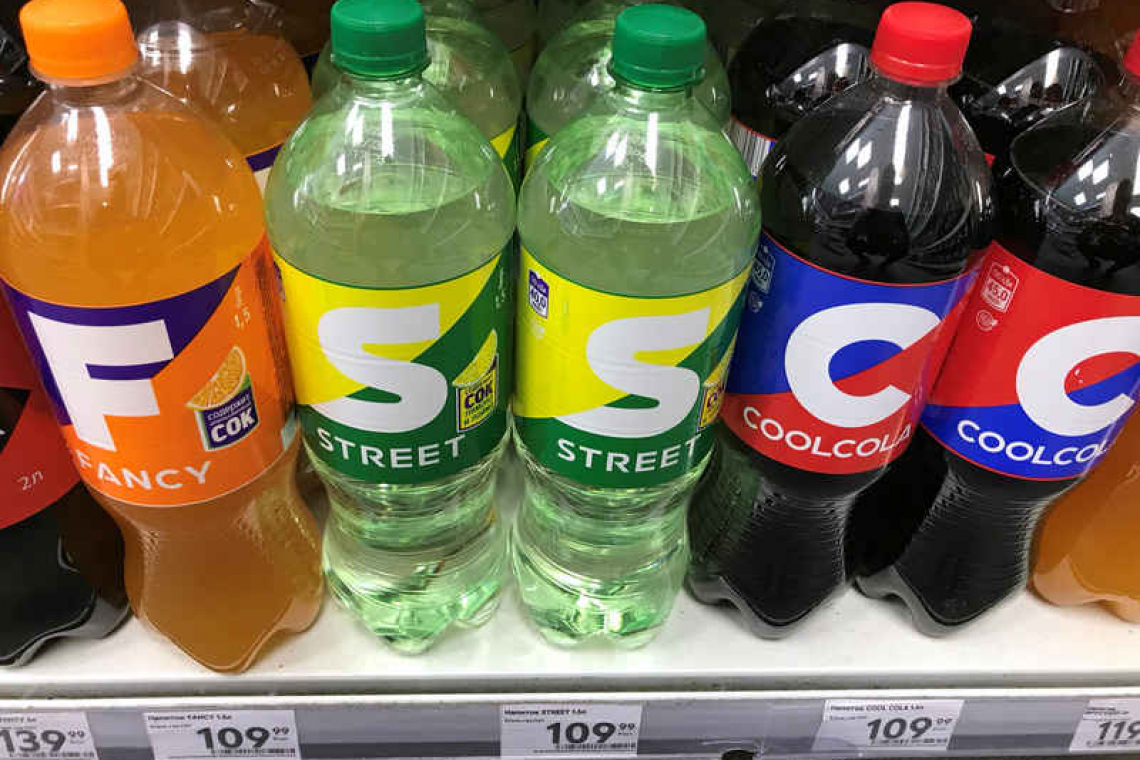A view shows a shelf with bottles of soft drinks at a shop in Moscow, Russia on Wednesday.
NEW YORK/MOSCOW--Western companies with iconic brands like Coca-Cola that exit Russia face years of battling knockoffs and unauthorized imports clamoring to fill the void they leave behind, a risky bid as courts show little sympathy for firms that depart.
Companies pulled back from Russia this spring after Moscow sent thousands of troops into Ukraine, in response to investor and public pressure. Some, like Coca-Cola Co, finalized their exit in August after five months, while others such as McDonald's Corp sold their businesses. Some including Procter & Gamble Co partially remained, selling essentials.
They are defending their trademarks to protect their brands from losing value, and in case they ever return to the country, intellectual property lawyers said. But they face a sea of opportunists, importers and flip-flopping court rulings.
Coca-Cola, first available in the Soviet Union in 1979, is already ensnared in fights against grey-market goods, which are unauthorized imports, and Russian knockoffs of its fruit-infused Fanta line, according to court documents and interviews with attorneys involved. Other companies' battles are just beginning as Russian entrepreneurs aim to capitalize on their well-known names as they depart.
Rospatent, the Russian government's intellectual property agency, is receiving an influx of applications for trademarks of Western brands popular in the country, said Robert Reading, head of content strategy in the intellectual property group at analytics firm Clarivate Plc, which tracks the filings.
In usual times, governments reject applications for trademarks that are identical or very similar to existing brands, intellectual property experts said. But the Russian government this spring adopted a decree allowing businesses to use patents from countries deemed "unfriendly," such as the United States and United Kingdom, without paying the owner of the intellectual property, putting Western brands on the defensive.
Russia also now permits “parallel imports,” or grey-market items, for products spanning from Carefree feminine products to any brand of footwear. The murky territory for major brands in Russia is like the “Wild West,” said Carey Kulp, a lawyer at Philadelphia intellectual property law firm Volpe Koenig PC.
"The big issue in Russia is, will the court support Western brands?" Reading said.
Moscow entrepreneurs Alexander Gershtein and Vadim Ryabchenko, who own a bandage and medical materials manufacturing business, applied for around 20 trademarks including Coca-Cola, Adidas, Mercedes Benz and P&G's Pampers diaper brand. Gershtein said his firm may be able to make items such as diapers branded as Pampers and he may license others, if he wins approvals, he said.
"If, for example, the state says it wants to produce...then we will give the state the Mercedes trademark," Gershtein said. "And there is nothing wrong with that."
He said he has not yet heard from the companies asking he withdraw his applications. P&G and Adidas declined to comment. Mercedes Benz did not return requests for comments.
Coca-Cola has so far largely failed to have a Russian judge take its side in cases against grey-market sodas imported from the United States, and competitors with nearly identical names, such as "Fantola," which have flooded the market. Importer Pivoindustria LLC has been able to sell thousands of cans of Fanta peach and pineapple and Coca-Cola Cherry - even though the government has not added sodas to the list of goods eligible for parallel imports.
Pivoindustria buys the sodas in U.S. Costco and Walmart stores and is considering importing more, a company executive said. The most recent shipment arrived in Russia in April, said Maxim Sosov, a lawyer for Pivoindustria.
Coca-Cola is seeking a judgment against Pivoindustria, after unsuccessfully trying to order customs to block the soda shipments, Sosov said. "(The judge) understands parallel imports are good because they are competition, cheaper price, and it is better for consumers," Sosov said, adding that they also help support Russian businesses.
Coca-Cola has appealed the court's decisions and has said it "protects its goodwill and reputation where third parties seek to trade off the company’s renowned, worldwide" brand.







